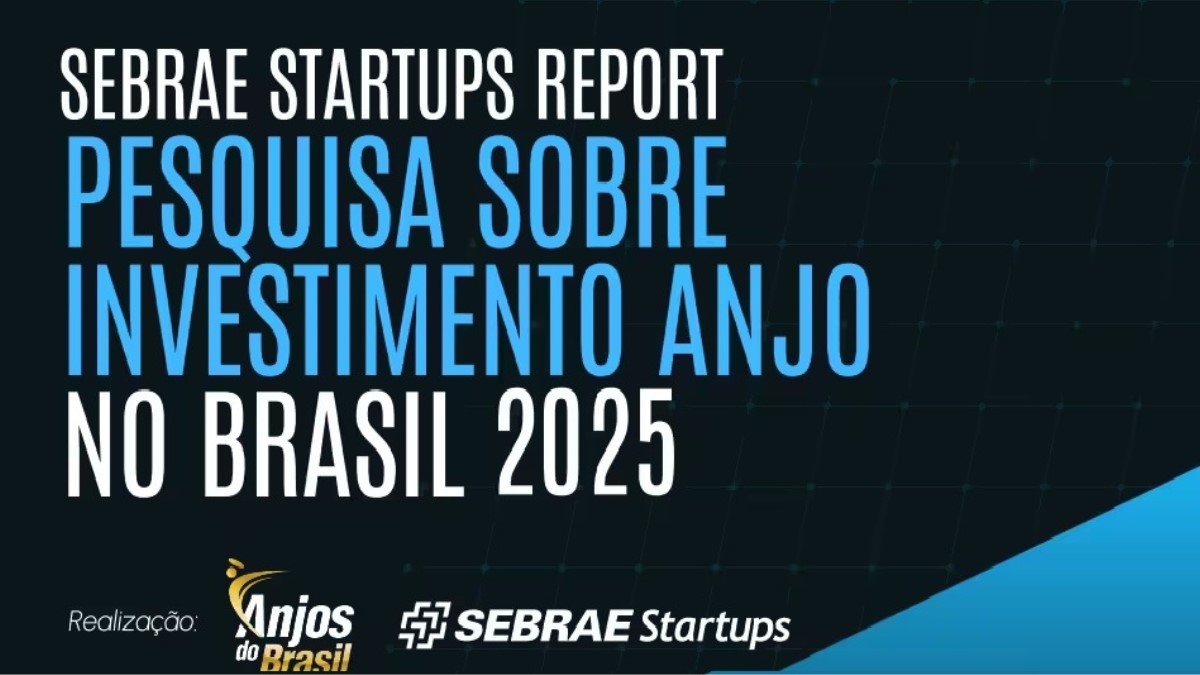
A study by the Sebrae Startups Observatory, in partnership with Anjos do Brasil, provides an unprecedented overview of the profiles, motivations, and challenges faced by startup investors.
Angel investing is still a growing field in Brazil, and a survey conducted by the Sebrae Startups Observatory in partnership with Anjos do Brasil seeks to understand what limits and what drives this market. The Angel Investment Survey in Brazil 2025, released this Thursday (28), during the second day of the Startup Summit 2025 program, mapped the profile of investors and potential investors across the country. The study details motivations, behaviors, obstacles faced, and the outlook for the future of the sector – highlighting the urgent need for tax incentives, greater transparency for startups, and the reduction of regulatory barriers.
Who are the angel investors in Brazil?
The survey identifies that the angel investor ecosystem in the country is largely male (81.5%), with a predominance of men between the ages of 41 and 50 (32.4%). Most respondents have previously started businesses and use their experience to support new ventures. Traditional entrepreneurs (34.8%) and executives (26.4%) make up the bulk of this group, suggesting that angel investing in Brazil is driven by experienced professionals seeking portfolio diversification and impact.
Although it still represents a minority, the female presence (18.5%) has been growing, pointing to a trend towards greater diversity in the ecosystem.
The main sectors of activity and interest of investors are linked to innovation: Information Technology (27.3%), Management and Consulting (22.2%), Capital and Investments (17.1%), Professional Services (13.33%) and Finance (12.70%). Also noteworthy are Agribusiness (10.16%) and Health and Well-being (9.52%).
Among the main motivations, financial return (40,84%), impact/legacy (32,42%) and mentoring/learning (26,74%) lead, demonstrating a balance between profit and purpose among investors.
Investment profile: caution and pursuit of quality
Fixed income is the main choice for angel investors, due to its security and predictability. However, there is a clear preference for portfolio diversification, including stocks (direct and through funds), real estate funds, and private pension plans.
Approximately 49% of investors invest less than R$250,000 in startups, while 14.5% invest more than R$1 million. The number of startups per portfolio also reflects this prudence: 59.3% invest in up to five businesses, and only 12.7% invest in more than 20 startups, indicating a strategy of close monitoring and in-depth analysis. Investments are primarily directed to the Seed (53.3%) and Pre-Seed (40.6%) stages, considered critical for startups' leverage and scalability.
Almost half of investors (47%) still don't know how to evaluate return on investment (ROI), which may indicate their recent entry into this market or the difficulty of measuring it in the short term. Among those who have already measured, 40.7% reported positive returns, with 6.8% achieving more than 5 times their invested capital. These results are more prevalent among individual investors with diversified portfolios.
Three investor profiles
The research identifies three predominant profiles among angel investors:
- Disciplined: focus on financial return, contributes between R$500,000 and R$5 million, invests both individually and collectively, with a strong presence in the Seed stage.
- Mentor Construtor: seeks impact and learning, contributes up to R$250,000, focuses on supporting and mentoring early-stage startups.
- Explorer: cautious, seeks knowledge and experience, invests smaller amounts and prioritizes safety and careful analysis of opportunities.
Opportunities, but with bottlenecks in access
The innovation environment in Brazil is dynamic: 75% of investors receive opportunities monthly or more frequently. However, 59.5% of potential investors report difficulties in accessing good opportunities, highlighting a disconnect between qualified startups and available capital.
Among the challenges to the expansion of angel investment in Brazil, the most cited are economic uncertainty and high risk (67,32%), difficulty finding good opportunities (33,17%), and lack of tax incentives (41,46%). Capital gains taxation, bureaucracy, and legal uncertainty also feature prominently. Furthermore, 92% of investors report difficulty locating qualified startups, highlighting structural flaws in access and company maturity.
Only 13.5% of Brazilian investors claim to use AI tools in their analyses, in contrast to the 72% of global adoption reported by McKinsey in 2024.
The search
The survey was conducted based on data collected between June and July 2025, with a sample of 315 participants from various sectors and profiles. Data were obtained through an online questionnaire with open- and closed-ended questions. The majority of respondents (65.4%) identify as active angel investors. The remainder are divided between interested investors (26.6%) and non-investors (7.9%). The analysis includes a qualitative dimension regarding perceptions, obstacles, and action strategies.
For Sebrae Startups, understanding investor behavior is a strategic step toward strengthening the country's innovation ecosystem. "Based on this data, it's possible to guide public policies, training programs, and more effective connection strategies between startups and investors," says Décio Lima, President of Sebrae. "It's essential to create tax incentives that attract more investors willing to foster the new economy. Angel investment needs to stop being the exception and become the rule in a country with a vocation for innovation. The result will be more opportunities, inclusion, job creation, and income."
"Brazil still invests far less in startups than would be compatible with the size of our economy," notes Cassio Spina, founder and president of Anjos do Brasil. "To change this scenario, it is essential to adopt policies that encourage angel investment, as several countries already do. These incentives do not mean a loss in revenue, but rather a gain, as they strengthen innovative entrepreneurship, increase competitiveness, and generate economic and social development. We hope this study represents another important step in raising awareness about the value that angel investment can bring to Brazil."
Sebrae Startups is Sebrae's platform focused on fostering innovative early-stage companies. Operating nationwide, it provides training, connections with investors, and initiatives to strengthen local ecosystems. Anjos do Brasil is a non-profit organization dedicated to promoting angel investment. It works to connect investors and entrepreneurs, disseminate knowledge, and support the formation of investment networks.
Want to access the full research? click here

















